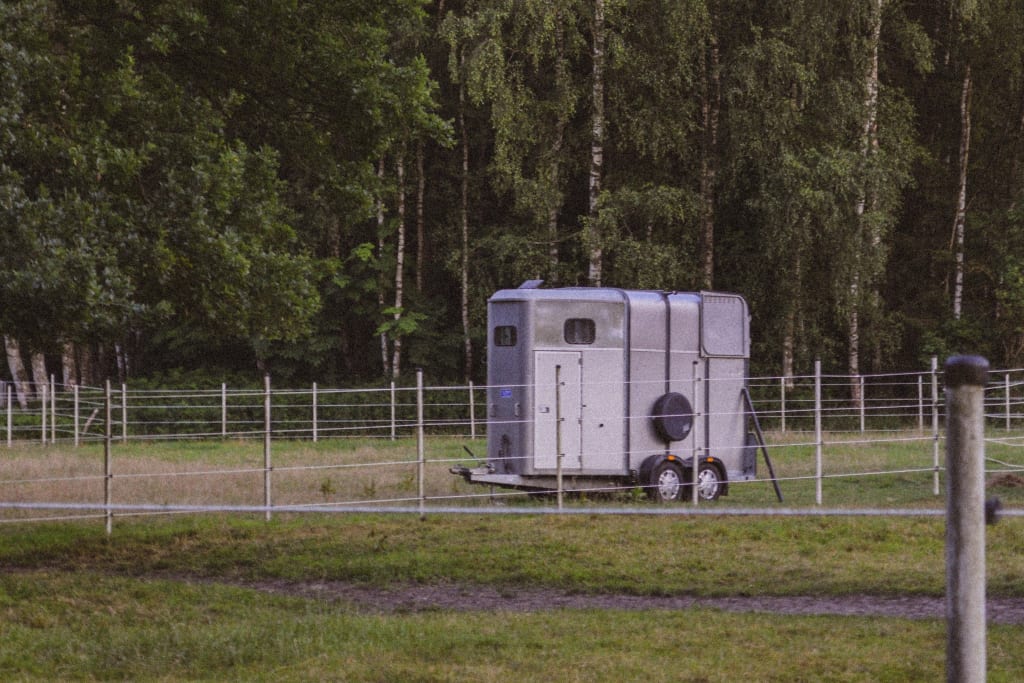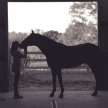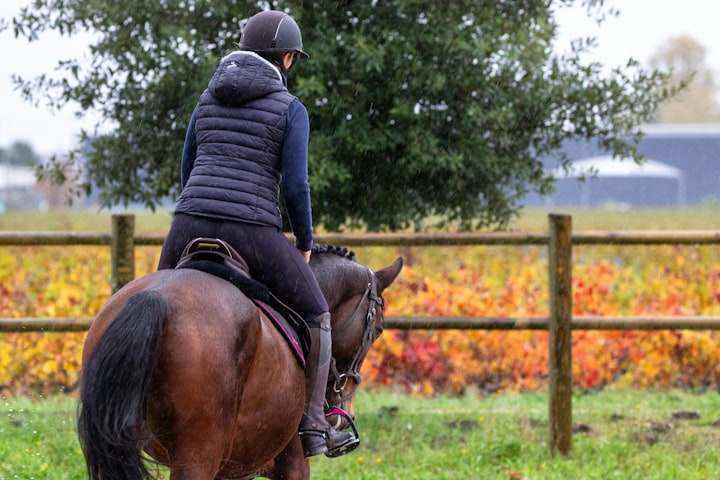Everything You Need to Know About Towing a Horse Safely in a Trailer in the UK
A Comprehensive UK Handbook

Towing a horse in a trailer requires careful planning and adherence to specific guidelines to ensure the safety and well-being of both the horse and the driver. As a responsible horse owner or rider, it is crucial to understand the laws and regulations surrounding towing a horse trailer in the UK. In this comprehensive guide, we will explore everything you need to know about towing a horse safely in a trailer in the UK, from understanding towing weights to maintaining your trailer.
1. Know Your Towing Capacity
Before embarking on any towing journey, it is essential to understand the towing capacity of your vehicle. Towing capacity refers to the maximum weight that your vehicle can safely tow. Exceeding this weight limit can put you, your horse, and other road users at risk.
To determine your vehicle's towing capacity, consult your vehicle's handbook or check the chassis plate. The maximum towing weight should not be lower than the weight you are planning to tow. It is crucial to accurately calculate your towing load by weighing your horses using a weigh tape and adding it to the weight of the trailer.
2. Ensure the Roadworthiness of Your Trailer
Maintaining the roadworthiness of your horse trailer is of utmost importance to ensure the safety of your horse and other road users. Regular servicing and inspections are necessary to identify any damage or issues with the trailer. Here are some key areas to focus on:
- Servicing
Regular servicing of your horse trailer is crucial to detect any potential issues and ensure it is in good working order. It is recommended to service your trailer at least once a year or as per the manufacturer's guidelines.
- Tyres
Check the condition of the tyres on your horse trailer regularly. Ensure they have sufficient tread depth (at least 1.6mm) and are free from cracks or damage. Keep in mind that cracks can develop if the trailer is left standing for long periods.
- Electrics
Ensure that all internal and external lights on your horse trailer are in proper working condition. Test the lights before every journey to ensure they are functioning correctly.
- Maximum Tow Weight
Always check the maximum towing weight of your vehicle to ensure it is not lower than the weight you are planning to tow. This information can be found in your vehicle's handbook or by checking the chassis plate.
- Insurance
While your car insurance may cover the trailer third party when towing, it is essential to check the extent of your coverage with your insurance provider. Consider getting additional insurance to cover theft or damage to your horse trailer.
3. Hitching Up Your Horse Trailer
Properly hitching up your horse trailer is crucial for safe towing. Follow these steps to ensure a secure connection between your vehicle and the trailer:
Prepare the Trailer: Ensure that the horse trailer's handbrake is engaged (or the chock is in place under the wheel) and that the trailer's tow bar is higher than the tow ball.
Positioning: Line up your vehicle so that you can reverse in a straight line towards the trailer. Use your rearview mirrors or rear window to guide your alignment.
Assistance: If needed, ask a friend to guide you during the hitching process to ensure you are aligned correctly with the tow ball.
Lower the Hitch: With one hand, hold the coupling head up and use the other hand to lower the hitch onto the tow ball by turning the jockey wheel. You should hear a click indicating a secure connection. To double-check, wind the jockey wheel back up, and you should see the vehicle lifting.
Breakaway Cable: Attach the breakaway cable to an eye or loop through a main brace of the tow bar. This cable is crucial as it activates the trailer's brakes if it becomes separated from the vehicle.
Electrics: Connect the 13 Pin electrics by lining up the gap of the vehicle's electrical socket with the gap in the tow hitch socket. Twist the connection to ensure it is secure and cannot be pulled out unintentionally.
Final Checks: Release the trailer handbrake and check that all lights, indicators, and brakes are functioning correctly. It is recommended to have someone stand behind the trailer to confirm the proper functioning of the brake lights.
Secure the Tow Ball: Grease the tow ball to ensure smooth operation and minimize wear and tear. Keep the tow ball greased regularly to maintain its effectiveness.
4. Loading Your Horse into the Trailer
Loading your horse into the trailer is a critical step that requires patience and proper handling to ensure their comfort and safety. Follow these guidelines for a smooth and stress-free loading process:
- Preparing the Trailer
Before loading your horse, ensure that the trailer is clean, well-ventilated, and free from any hazards. Check the flooring and ramp for stability and make any necessary adjustments or repairs.
- Positioning
Position the trailer on level ground with the ramp securely in place. If you are towing only one horse, position them on the right side of the trailer to account for the camber of the road.
- Gentle Approach
Approach your horse calmly and confidently, using a lead rope or bridle for control. Speak soothingly to your horse to reassure them and create a positive atmosphere.
- Step-by-Step Loading
Encourage your horse to enter the trailer step by step, allowing them time to adjust at each stage. Use treats or positive reinforcement to incentivize them. Avoid rushing or forcing your horse into the trailer, as this can cause stress and resistance.
- Securement
Once your horse is inside the trailer, secure them with appropriate restraints such as breast bars, tail guards, or cross ties. Double-check the security of the restraints to ensure your horse's safety during transport.
5. On the Road: Safe Towing Practices
When towing a horse trailer, it is crucial to practice safe driving techniques to protect both your horse and other road users. Follow these guidelines for a safe towing experience:
- Anticipate Stops and Maintain Distance
Due to the additional weight and longer stopping distances, anticipate stops and leave ample space between your vehicle and the one in front of you. Braking with a trailer requires more time and distance, so maintaining a safe following distance is essential.
- Maintain a Moderate Speed
Adhere to the speed limits for towing trailers. On single-carriageways, the speed limit is 50mph, while on dual-carriageways and motorways, it is 60mph. However, it is advisable to drive at a moderate speed that you are comfortable with, considering the road conditions, weather, and traffic.
- Read the Road and Take Turns Slowly
To ensure a smooth journey for your horse, read the road ahead and take turns slowly and deliberately. Be mindful of the trailer's width and turning radius, especially on sharp bends. Pay attention to your trailer's position during turns to avoid cutting corners or hitting curbs.
- Stay Alert and React Responsibly
Maintain focus and stay alert while towing a horse trailer. Be aware of other road users and anticipate any potential hazards. If you encounter challenges, such as snaking or swaying, do not panic. Ease off the accelerator, maintain a steady grip on the steering wheel, and take corrective measures gradually.
6. Reversing a Horse Trailer
Reversing a horse trailer can be a daunting task, but with practice and patience, it can become more manageable. Here are some tips to help you master the art of reversing a horse trailer:
- Steer in the Opposite Direction
When reversing your vehicle and trailer, remember to steer in the opposite direction initially. This means that if you want to reverse your vehicle and trailer to the left, you need to turn the steering wheel to the right. This manoeuvre helps guide the trailer in the desired direction.
- Use Small Steering Movements
Once the trailer starts moving in the desired direction, avoid making large and abrupt steering movements. Instead, make small and gradual adjustments to fine-tune the trailer's path. If you find yourself in a difficult position, it is better to pull forward and try again rather than risking a jackknife situation.
- Take Your Time and Be Patient
Reversing a trailer requires precision and patience. Take your time, and don't rush the process. It is better to spend a few extra minutes ensuring a safe and controlled manoeuvre than risking accidents or damage.
- Use Mirrors and Helpers
Utilize your mirrors to gauge the trailer's position and trajectory. If possible, have someone outside the vehicle guide you during the reversing process. Their assistance can provide valuable perspective and help you navigate tight spaces more effectively.
7. Maintaining Your Horse Trailer
Regular maintenance is crucial to ensure the longevity and safety of your horse trailer. Here are some key maintenance tasks to perform:
- Regular Cleaning
Clean your horse trailer regularly, both inside and out. Remove any debris, manure, or bedding to prevent the buildup of moisture and potential damage. Disinfect surfaces to maintain a clean and hygienic environment for your horse.
- Floor and Ramp Inspection
Inspect the floors and ramps of your horse trailer periodically for any signs of damage, rot, or wear. Lift the rubber matting and examine the floors from above and below. Use a screwdriver to probe suspect areas for weaknesses or deterioration.
- Tyre Care
Regularly check the condition and pressure of your trailer's tyres. Ensure that the tread depth meets the legal requirements and look for any sidewall cracks or bulges. Replace worn or damaged tyres promptly, and adhere to the recommended pressure levels.
- Hitch and Towball Maintenance
Keep the tow ball greased to ensure smooth operation and minimize wear. Check the wear indicators in the hitch and replace worn tow balls as needed. Clean the hitch cup regularly and apply clean grease to moving parts.
- Brake and Wheel Bearing Inspection
Inspect the trailer's brakes and wheel bearings regularly. Adjust the brakes for wear and replace brake shoes when necessary. Grease and adjust wheel bearings as per the manufacturer's recommendations. If unsure, consult a trailer or caravan dealer for professional assistance.
8. Legal Considerations
When towing a horse trailer in the UK, it is essential to comply with legal requirements and regulations. Here are some key points to keep in mind:
- Driving Licence
Ensure that you have the correct driving licence for towing a horse trailer. The requirements vary based on the date you obtained your driving licence. If you passed your driving test before January 1, 1997, you are allowed to drive a vehicle and trailer combination with a combined weight of up to 8250kg. If you passed your driving test after January 1, 1997, you are permitted to tow a trailer weighing up to 3,500kg.
- Breakaway Cable
Trailers are legally required to have a breakaway cable that applies the trailer's brakes if it becomes unhitched. Always ensure that the breakaway cable is securely attached to a purpose-made towbar ring or another substantial part of the car.
- Insurance
While insurance coverage for towing a trailer may be included in your car insurance policy, it is advisable to review your policy and confirm the extent of your coverage. Consider obtaining additional insurance to protect against theft or damage to your horse trailer.
9. Breakdown Assistance and Support
In the event of a breakdown or emergency while towing your horse trailer, it is essential to have appropriate support and assistance. Here are some options to consider:
- Breakdown Cover
Ensure that you have suitable breakdown cover that includes support for your trailer. Standard car breakdown cover often excludes recovery of a trailer with horses aboard. Explore options for specialized equestrian breakdown cover that provides specific support for towing horse trailers.
- Professional Services
Various professional services specialize in equestrian breakdown support. Consider organizations such as Equine Rescue Services or The Organisation of Horsebox and Trailer Owners for dedicated assistance during breakdowns or emergencies.
10. The Importance of Responsible Towing
Towing a horse trailer is a significant responsibility, impacting the safety and welfare of both horses and other road users. It is crucial to prioritize safety, proper maintenance, and adherence to legal requirements. By following best practices and investing in regular maintenance, you can ensure a safe and enjoyable towing experience for you and your horse.
Remember, towing a horse trailer requires expertise and care. If you are unsure or lack experience, consider seeking professional training to enhance your towing skills and knowledge.
Horse Trailer
In conclusion, towing a horse safely in a trailer in the UK requires careful planning, adherence to regulations, and regular maintenance. By understanding your vehicle's towing capacity, properly hitching up your trailer, and following safe driving practices, you can ensure the well-being of your horse and the safety of all road users. Regularly inspect and maintain your trailer to prevent potential issues and breakdowns. Responsible towing is essential to protect your horse and maintain the integrity of equestrian transport.
About the Creator
Jane Smith
I'm a horsewoman who is angry about everything that is wrong with the horse world in the UK.
I am the woman who is not afraid to say what she thinks, and I'm not going to stop until the world is a better place for horses.






Comments
There are no comments for this story
Be the first to respond and start the conversation.